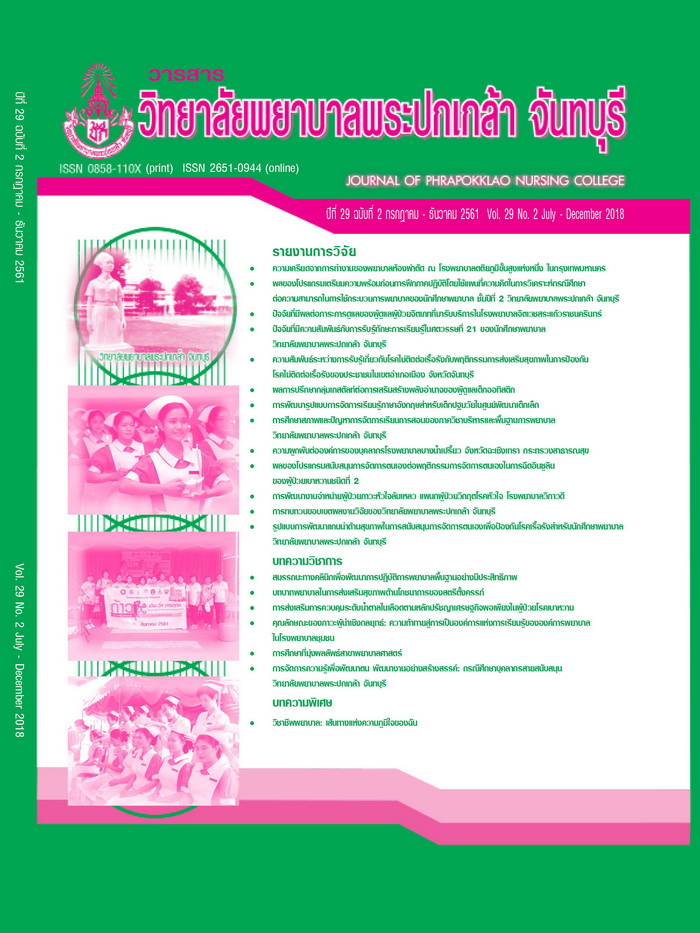Model of Health Mainstay Development for Self-management Support in Preventing Chronic Disease among Nursing Students at Phrapokklao Nursing College
Keywords:
Health mainstay, Self-management, Chronic diseaseAbstract
This action research aimed to explore the model of health mainstay development for self-management support in preventing chronic disease among nursing students. The samples consisted of 136, 1st-year nursing students studying at Phrapokklao Nursing College, Chanthaburi, 2nd trimester, in an academic year of 2015. The research instruments included a test of knowledge regarding self-management support with the reliability of .76, an assessment form of self-efficacy for self-management support with the reliability of .90, an assessment form of opinion toward a health mainstay with the reliability of .95, and a question guideline of opinion toward a health mainstay. The implementation and data collection were conducted from March to December, 2016. Data were analyzed using paired t-test, mean, standard deviation, and content analysis.
The research results revealed that 1) the model of health mainstay development for self- management support in preventing chronic disease among nursing students was composed of 4 steps: 1.1 preparation the knowledge regarding self-management support and team working, 1.2 competency building on health mainstay, 1.3 encouragement the role practicing on health mainstay, and 1.4 effectiveness evaluation of the model and sharing experiences; 2) after the model implementation, the nursing students had statistically significant higher mean score of knowledge regarding self-management support than before the model implementation (t = 1.939, p < .05); as well as they had an overall mean score of self-efficacy for self-management support at a high level (M = 4.29, SD = .40) and had an overall mean score of opinion toward a health mainstay at a high level (M = 4.27, SD = .43); and 3) the nursing students had ability to initiate project design and the innovations. In addition, they could perform the role of health mainstay, and the satisfactions among the participants were at a high level.
This research suggests that the colleges should apply this model of health mainstay development for learning in other subjects in order to foster nursing students’ creative thinking in applying a self-management concept to develop model of chronic disease prevention.
References
ชดช้อย วัฒนะ, จงรักษ์ ศุภกิจเจริญ, ณฐวรรณ รักวงศ์ประยูร, และปริญญา แร่ทอง. (2558). ผลของโปรแกรมการส่งเสริมสมรรถนะการจัดการตนเองเพื่อควบคุมโรคต่อพฤติกรรมการควบคุมโรค ระดับความดันโลหิต และคุณภาพชีวิตของผู้เป็นโรคความดันโลหิตสูง ในการศึกษาระยะยาว. วารสารวิทยาลัยพยาบาลพระปกเกล้า จันทบุรี, 26(เพิ่มเติม 1), 72-89.
พิมพ์ใจ อุ่นบ้าน. (2555). รูปแบบการพัฒนาภาวะผู้นำด้านการสร้างเสริมสุขภาพของนักศึกษาพยาบาล วิทยาลัยพยาบาล สังกัดสถาบันพระบรมราชชนก กระทรวงสาธารณสุข. วารสารการพยาบาลและการศึกษา, 5(3), 88-101.
ลดาวัลย์ ฤทธิ์กล้า, ชดช้อย วัฒนะ, และพีระพงค์ กิติภาวงค์. (2555). ผลของโปรแกรมการส่งเสริมการจัดการตนเองต่อพฤติกรรมการจัดการตนเอง ภาวะหายใจลำบาก ความสามารถในการทำกิจวัตรประจำวัน และคุณภาพชีวิตของผู้ป่วยภาวะหัวใจล้มเหลว. พยาบาลสาร, 39(1) 64-76.
วิโรจน์ สารรัตนะ. (2556). กระบวนทัศน์ใหม่ทางการศึกษา กรณีทัศนะต่อการศึกษาศตวรรษที่ 21. กรุงเทพฯ: ทิพยวิสุทธิ์.
สถาบันวิจัยและประเมินเทคโนโลยีทางการแพทย์ กรมการแพทย์. (2556). สถานการณ์โรคเบาหวาน ความดันโลหิตสูง และภาวะแทรกซ้อนในประเทศไทย. สืบค้นจาก https://www.dms.moph.go.th/imrta/
Altrichter, H., Kemmis, S., McTaggart, R., & Zuber-Skerritt, O. (2002). The concept of action research. The Learning Organization, 9(3), 125-131.
Bandura, A. (1997). Self-efficacy: The exercise of control. New York: Freeman.
Bass, B. M., & Bass, R. (2008). The Bass handbook of leadership: Theory, research, and managerial applications (4th ed.). New York: Free Press.
Creer, T. L. (2000). Self-management of chronic illness. In M. Boekaerts, P. R. Pintrich, & M. Zeidner (Eds.), Handbook of self-regulation (pp. 601-630). San Diego, CA: Academic Press.
Grundy, S. (1987). Curriculum: Product or praxis. London: Falmer Press.
Holter, I. M., & Schwartz-Barcott, D. (1993). Action research: What is it? How has it been used and how can it be used in nursing?. Journal of Advanced Nursing, 18(2), 298-304.
Pratt, S. (2003). Cooperative learning strategies. The Science Teacher, 70(4), 25-29.
Riding, P., Fowell, S., & Levy, P. (1995). An action research approach to curriculum development. Information Research, 1(1), 1-7.
Sokovic, M., Pavletic, D., & Pipan, K. K. (2010). Quality improvement methodologies–PDCA cycle, RADAR matrix, DMAIC and DFSS. Journal of Achievements in Materials and Manufacturing Engineering, 43(1), 476-483.
Sung, H. Y., & Hwang, G. J. (2013). A collaborative game-based learning approach to improving students’ learning performance in science courses. Computers & Education, 63, 43-51.
Wagner, E. H., Glasgow, R. E., Davis, C., Bonomi, A. E., Provost, L., McCulloch, D., … Sixta, C. (2001). Quality improvement in chronic illness care: A collaborative approach. Joint Commission Journal on Quality Improvement, 27(2), 63-80.
Wattana, C., Srisuphan, W., Pothiban, L., & Upchurch, S. L. (2007). Effects of a diabetes self-management program on glycemic control, coronary heart disease risk, and quality of life among Thai patients with type 2 diabetes. Nursing & Health Sciences, 9(2), 135-141.
Downloads
Published
How to Cite
Issue
Section
License
เนื้อความ ข้อมูล และรายการอ้างอิงที่ผู้เขียนใช้ในการเขียนบทความเพื่อลงตีพิมพ์ในวารสารวิทยาลัยพยาบาลพระปกเกล้า จันทบุรี ถือเป็นความคิดเห็นและความรับผิดชอบของผู้เขียน คณะผู้จัดทำวารสารไม่จำเป็นต้องเห็นพ้องด้วยหรือร่วมรับผิดชอบ
บทความที่ได้รับการลงตีพิมพ์ในวารสารวิทยาลัยพยาบาลพระปกเกล้า จันทบุรี ถือเป็นลิขสิทธิ์ของวารสารวิทยาลัยพยาบาลพระปกเกล้า จันทบุรี หากหน่วยงานหรือบุคคลใดต้องการนำส่วนหนึ่งหรือทั้งหมดของบทความไปเผยแพร่ต่อเพื่อวัตถุประสงค์ใด ๆ จะต้องได้รับอนุญาตจากบรรณาธิการวารสารก่อน



